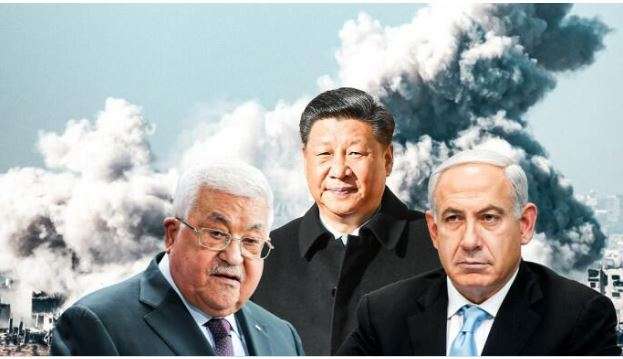First the Ukraine war and now the Gaza conflict… China increasingly finds itself the leader of the group of nations at odds with the West over how to handle these crises.
Beijing has criticized the United States’ role in stoking both conflicts, given Washington is the main supplier of weapons and funds for both Israel and Ukraine.
Most Global South countries are quite obviously more sympathetic to the Palestinian side when it comes to the Gaza crisis (evidenced by recent votes at the UN), and they have shown themselves open to trade with Russia despite sanctions over the Ukraine war, and most have tended to avoid full-throated condemnations of the Russian invasion of Ukraine.
In a new report, Bloomberg has underscored that Gaza is the new ‘wedge issue’ which China hopes to use to further distance the Global South from US and Western policy:
Last week, a top Chinese diplomat took to the microphones at the United Nations to harangue the US for blocking a resolution that would have backed Palestinians’ bid for membership, saying it had “shattered the decades-long dream of the Palestinian people.”
The broadside by Ambassador Fu Cong may have just looked like more anti-US rhetoric. But US officials and experts say it fits into a pattern with greater significance — an increasingly active Chinese effort to turn opinion in developing countries against the US since Hamas’s Oct. 7 attack on Israel, using the Gaza war as a wedge.
At the May President Xi Jinping was in France where he issued a rare joint statement with French President Emmanuel Macron. The statement urged Israel against going through with a ground offensive in Rafah.
Macron and Xi further reiterated their call for “a decisive and irreversible relaunch of a political process” to implement “the two-state solution with Jerusalem as their capital, and the creation of a viable, independent and sovereign Palestinian state on the basis of the 1967 lines,” according to the joint statement.
The Chinese foreign ministry also issued its own separate statement, saying “China… strongly calls on Israel to heed the overwhelming demands of the international community, stop attacking Rafah, and do everything it can to avoid a more serious humanitarian disaster in the Gaza Strip.”
Beijing has also really stepped up its denunciations of Washington ‘hypocrisy’ given the Biden administration is at once arming Israel to the teeth while publicly condemning the soaring Palestinian civilian death toll which has been the end result of deploying those very arms over population-dense urban areas. Bloomberg has further featured the following Chinese Embassy statement:
Liu Pengyu, a spokesperson for the Chinese Embassy in Washington, criticized the US for talking about “a ceasefire while pouring weapons” into the “biggest humanitarian tragedy in the 21st century,” in an emailed statement.
China has lately launched its own efforts at mediating the conflict, given it hosted Hamas and Fatah officials in Beijing in May for rare talks aimed at achieving Palestinian political unity.
Bloomberg has cited the UK-based Institute for Strategic Dialogue to say that “Chinese and Russian actors are capitalizing on the perceived unpopularity of Western policy towards Gaza.” And ultimately the aim, the think tank says, is “to push the idea of an alternate global power structure with themselves at the helm.”
But of course, this doesn’t seem to take into account that it might more simply be US and Israeli actions and policies are actually deeply unpopular among large segments of the population.
US Ambassador Linda Thomas-Greenfield recently echoed this outlook which sees nefarious Russian and Chinese influence behind every corner. “Let’s be honest — for all the fiery rhetoric, we all know that Russia and China are not doing anything diplomatically to advance a lasting peace,” she told the UN General Assembly in March.
But the reality is that it was China which recently achieved the historic Iran-Saudi rapprochement, thus it at least has a positive track record of mediation in the Mideast region of late. Compare this to the US role of the last ten to twenty years, and there are names like: Afghanistan, Iraq, Libya, Syria.







